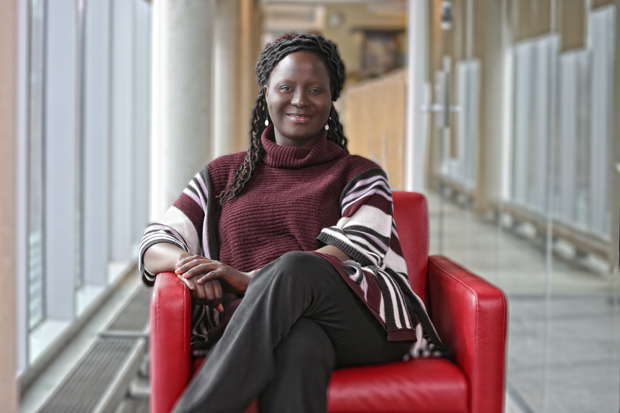Meet our new faculty member: Emilie Diouf, assistant professor of English
 Photo/Mike Lovett
Photo/Mike LovettEmilie Diouf
As part of our series profiling new professors, Emilie Diouf, assistant professor of English, talked with BrandeisNOW about her field and research. Diouf joined the Brandeis faculty in the fall of 2017.
How did you become interested in your field/research area?
My interest in Anglophone and Francophone African literature and film stems from a yearning to understand the socio-cultural, political, and historical shifts that took place in the African continent in the 1990s, namely, the end of Apartheid in South Africa and the genocide of the Tutsis in Rwanda.
I was a teenager in Senegal when these two major events unfolded and I had no idea they would become a big component of my career as a teacher and scholar. Although I don’t remember seeing much press coverage about the Rwandan genocide in Senegal at the time, the more I read about it, the more drawn I was to the interdisciplinary study of the relationship between narrative and trauma. I specifically wanted to explore the ways in which women survivors of the genocide narrated the large-scale violence inflicted upon them. I was also interested in examining how the narration of their traumatic experiences contributed to conflict transformation, specially as it relates to gender based violence in their communities.
What was your favorite course as a college student?
The course that significantly contributed to forging my research interests was the first course I took on African women’s literature. It was taught by one of the two female professors in the department of English at Cheikh Anta Diop University in Dakar at the time. The professor’s pedagogy was unapologetically feminist in a Senegalese sense of the word. The course not only exposed me to the aesthetics of African women’s novels, but it also enabled me to critically engage with the complex intertwining of the social, political, economic, and cultural systems that overdetermine the experiences of African women.
What has been your proudest career moment so far?
At this point in my career, my proudest moment is to be part of Brandeis, a vigorous intellectual community that shares my views of knowledge production as a means to enhance critical inquiry into systemic oppression and to promote social justice globally.
What specific question/project are you most excited to explore in your work at Brandeis, and why?
I am excited to introduce students to some of Africa’s literary and film legends. I also would like to build on my experience and connections at Cheikh Anta Diop University in Dakar, Senegal to develop a study abroad program centered on “Senegalese Filmmakers, Cultural Heritage, and Social Transformation.”
As far as research is concerned, I am thinking through a book that deals with questions such as how can humanitarian work withstand the vicissitudes of victimization while remaining committed to the necessity to validate the traumas suffered by African women refugees? What is at stake when African women are routinely perceived through the lens of their suffering and not through their political agency?
What book would you recommend to introduce others to your field?
I would recommend “Nervous Conditions” by Zimbabwean writer Tsitsi Dangarembga because of the author’s creative rendition of what she refers to as the “complexities of postcolonial subjecthood.”
What's your favorite book/movie/television/radio program/podcast or hobby unrelated to your field, and why?
Presently, my favorite show is “The Deuce,” a HBO series co-created by George Pelecanos and David Simon, who worked together on “The Wire” and “Treme.” It is hardly escapist but I find it interesting in its focus on sexual exploitation as inseparable from misogyny, homophobia, racism, and corruption.
What has surprised you about Brandeis since you came to campus?
I was pleasantly surprised by the students’ commitment to social responsibility.
What advice do you have for students who are interested in your field?
My advice to students interested in African literature is to be unafraid of the “less familiar” and to know that literary studies are not mere diversion or aesthetic self-indulgence but can in fact be a means of engaging with different political and social problems.
Categories: Humanities and Social Sciences





